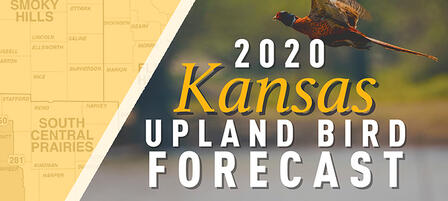
KDWPT
PRATT – November 14 marks the opening day for Kansas’ regular quail and pheasant seasons, and November 21 marks the opening day of Kansas’ regular greater prairie chicken season. This year, the outlook looks promising, as both popular upland game bird populations appear to be faring well. But when opportunities exist statewide, it can sometimes be difficult for upland bird hunters to narrow down the best locations to hunt. That’s where the 2020 Kansas Upland Bird Forecast comes in handy.
The forecast – produced annually by the Kansas Department of Wildlife, Parks and Tourism (KDWPT) – is compiled from data collected during spring calling surveys for pheasants (crow counts), quail (whistle counts), and prairie chickens (lek counts), as well as late-summer roadside surveys for pheasants and quail.
The 2020 Kansas Upland Bird Forecast, available online at ksoutdoors.com/Hunting/Upland-Birds, includes the following highlights:
Quail
Data suggests Kansas might again have one of the nation’s best bobwhite quail harvests this season, with dense populations of quail in central Kansas.
“Our quail did amazing things again, especially in north-central Kansas,” said Jeff Prendergast, KDWPT small game specialist. “Some landowners have told me they’ve never seen it like this and some have been farming 40 or 50 years. People need to get out and enjoy this while it’s this good.”
Numbers look especially promising in much of south-central Kansas, too. Southwest Kansas could have some good pockets of birds, and while northeast Kansas saw a significant population increase, it will likely not compete with locations further west.
Pheasants
Northwest and north-central Kansas should have the state’s best pheasant numbers this season. There, populations are similar to last season when Kansas ranked second in the nation for quality pheasant hunting. Though, hunters should note: Great hunting spots may be more fragmented than usual because of summer rains.
“Hunters could have an exceptional day in one spot, then move a couple of miles and hardly find any birds,” said Prendergast. “Where we had those rains, the birds should have done fairly well.”
Pheasant populations in south-central Kansas may be slightly down from last season, but good pockets of birds are still to be expected. Like north-central Kansas, the region should produce good mixed bag hunting.
“Hunters who’d like to focus on quail and take pheasants as they come, should be pretty happy this year,” said Prendergast. “Southwest Kansas will also have some good localized populations.”
Prairie Chickens
While greater prairie chickens have declined in eastern regions, the population appears to have expanded in numbers and range in the northwestern portion of the state. This fall, hunting opportunities for greater prairie chickens will be best in the Northern High Plains and Smoky Hills Regions, where populations have either increased or remain stable, and where public access is more abundant. Note, all prairie chicken hunters are required to purchase a $2.50 Prairie Chicken Permit, available at kshuntfishcamp.com. The Southwest Prairie Chicken Unit, where lesser prairie chickens are found, will again remain closed to hunting this year.
Regardless of preferred upland bird species, hunters can be as mobile as needed when utilizing Kansas’ 1.7 million acres of scattered public hunting lands. Much of the state’s one million-plus acres are tracts enrolled in KDWPT’s Walk-In Hunting Access program – commonly referred to as WIHA – and sit as a patchwork throughout the state’s main pheasant range. Hunters may also find quality bird hunting opportunities through the department’s newest public access program, iWIHA. Through iWIHA, hunters can reserve hunting access on private lands with limited access. For more information on WIHA and iWIHA, or to view maps of lands open to public hunting, visit ksoutdoors.com.
Pheasant and quail seasons run through Jan. 31 in Kansas, so there’s plenty of time to plan. In the meantime, grab a license at kshuntfishcamp.com or through KDWPT’s mobile app, HuntFish KS, and prepare to enjoy a fall season unlike any other.






